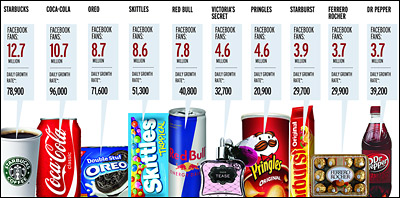Can Facebook Fan Pages become the new brand websites?
One of the latest articles of AdAge highlights the reach of the biggest Facebook fan pages of brands.
The article makes clear that many marketers have more success these days with their social media presence than with their traditional “owned media” – their brand sites. The question arises if the new “owned media” will become the Facebook sites where companies invest a lot of effort in these days. In just one year the shift from “onsite to offsite” becomes obvious when we can obey that Coke’s brand website and NabiscoWorld.com are showing a massive decline in traffic figures based on Compete data. Only Starbucks seems to maintain their brand sites web-traffic with significant e-commerce traffic success.
Many marketers are still not quite sure how and in which way to get engaged in all the social media hype. And if they do, a recent study by the Brand Science Institute shows that 73% had to show ROI figures after 12 months, although only 27% had a clear understanding of who their customers are… and probably none of how they interact on the social web. And 92% (!!!) were not aware of their Facebook dependency…
The expectations are high on social media… and especially when Facebook becomes part of the social media strategy. Posts like those of AdAge suggest that Facebook fan pages will become the new brand sites, or at least replace the importance of traditional brand sites.
And now to the experts… What is your take on this?

